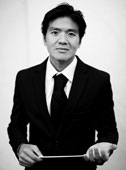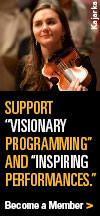The Ramakrishna-Vivekananda Center of New York presents
The Planets & Poems of Ecstasy
<< Return to concert description
Click on a photo to read artist biographies and interviews.
Artists and Insights

Composer-Conductor Sung Jin Hong is the artistic director of One World Symphony. The New York Times described Hong’s From The Alchemist as transforming “a novel to a lush Mahlerian sound.” Mr. Hong’s upcoming composition commissions include a piano concerto for Lloyd Arriola in addition to the symphonic poem The Architect for Ramakrishna-Vivekananda. His recent commissioned and performed symphonic works include Eye of the Storm (2010–2011) and Sidewalk Sketches (2010). His compositions have been performed at the New York International Fringe Festival, the central New York Public Library on Fifth Avenue, Bard College, and Palai Corbelli in Vienna, Austria. Mr. Hong’s guest conducting engagements include Lyrique-en-mer in France, Stadt Wien Konservatorium in Vienna, Royal Northern Conservatory in Manchester, Tulsa Symphony, Tulsa Ballet, Manhattan School of Music, Mannes, Redlands University, Bradley University, Western Illinois University, Great Music for a Great City. Mr. Hong had the honor of being chosen by Kurt Masur to participate in a series of masterclasses and conduct in a concert with Manhattan School of Music Symphony. He made his international recording debut as a conductor with classical music’s largest record label, Naxos.

Soprano Sonya Headlam is excited to join One World Symphony for the 2012–2013 Season. She has performed with One World Symphony on numerous occasions since 2006, including the critically-acclaimed Nordic Lights, Berlioz’s Les Nuits d’Été, Creation vs. Evolution and Moonlight programs. Ms. Headlam has been a featured artist with various groups locally, across the country, and internationally such as the Cuban Philharmonic, the Greenwich Choral Society, Bronx Orchestra, the Master Singers of Milwaukee, and DCINY with whom she made her Carnegie Hall debut in 2010. Equally comfortable on the operatic stage, she has worked with regional opera companies such as the Bronx Opera, Delphi Opera, and Fargo-Morehead Opera. An avid recitalist, she was recently featured on the Trinity Church’s Concerts at One series, which was webcast live from downtown Manhattan. In early 2012, she began to teach herself how to play the ukulele. She has since had several exciting opportunities to perform international folk music with her uke on stages in New York City as well as all over Japan. Ms. Headlam is currently working on recording her debut album of art songs, to be released in 2013.
Can you please tell us about the composers and the compositions that you are performing? What makes each work special and what are you looking forward to the most when you will be performing it?
I will be performing two songs, one by American composer Amy Beach, and the other by French composer Henri Duparc. There are many things that draw me to this music, not just as standalone compositions, but also in the context of this One World Symphony program featuring compositions that embody the fleeting and intense human emotion, ecstasy. Both Beach and Duparc wrote in the romantic style and set poems of ecstasy to music for voice and piano within twenty years of each other. Their personal compositional styles and representations of ecstasy provide a unique juxtaposition. Beach’s song has a soaring melody, and refined lyricism. The text, which she also wrote, captures feelings of deep commitment, trust, and perhaps a love that surpasses death. Harmonically, Duparc’s song begins ambiguously. It is earthy, and strikingly sensuous, from which the vocal line emerges, vulnerable, yet tranquil, “Sur un lys pâle mon coeur dort d’un sommeil doux comme la mort — On a pale lily my heart sleeps in a slumber sweet like death.” I look forward to performing these songs because I love them! I also think both of them are particularly well suited for orchestration, and performing them in this context will provide an opportunity to explore new and exciting colors and nuances.
Why would you recommend our public to attend One World Symphony’s Ecstasy program on November 11, 2012 at 3:30 p.m. at Florence Gould Hall?
The rhapsodic music of Scriabin, Björk, Clara Schumann, Beach, Duparc, Sung Jin Hong’s world premiere of his work, The Architect, and Holst’s Jupiter and Mars! I recommend this concert for the unique programming alone, but also for the opportunity to experience a diverse group of musicians that are 100% committed to making intimate and inspired music.
If you had an opportunity to meet for a drink with your respective Ecstasy composers, where would you take them in NYC and what would you ask?
I would bring a carafe of hot tea and take Ms. Beach for a pedicab ride through Central Park. As much as I hate to admit it, I’d probably go straight into romantic era gossip. Like, did you ever meet Liszt? What was he really like? What about Pauline Viardot-Garcia? What exactly was going on with her and Turgenev? Then, I would use my iPhone to give her an overview of what has been going on in classical music in the late 20th and early 21st centuries, hoping that it would lead to a conversation about what she thinks would be different had she had the opportunity to perform and compose in present day. However, the last place I would want to take Monsieur Duparc would be Central Park. It is well known that he suffered from various mental and physical ailments that left him in chronic pain with hyper sensitivity to stimuli. For that reason I would take him for a stiff cocktail at Campbell’s Apartment in Grand Central Station on a quiet afternoon. What would I ask him? Well, we share a passion for Wagner, so I suppose I’d start there. But inside I’d be thinking, “Why? Oh, why did you destroy it all?!” (Duparc destroyed most of his body of work)
What made you decide to become a musician?
Does one decide to become a musician? Perhaps some do, but for me, I’ve always felt that there was no choice involved. It is simply a part of who I am due mainly to my upbringing. I feel very strongly about this next statement. Music is a language. Further, just like my mother tongue, English, music is a language I was exposed to from birth, and it is a language that I’ve been working at refining from a very young age. Thanks to my parents, not long after I was learning how to sound out words and read complete sentences, I was learning how to read music and play little ditties on the piano. It was not always easy, and although my mom was taken aback by my sensitivity to music from a very young age (the Motown hit, Oooh Baby Baby, would cause me to wail uncontrollably at the age of 3, which made the radio seem like quite a dangerous apparatus to my poor mother) I certainly did not display any signs of being musically gifted. There were times I wanted to give up piano lessons entirely, but my parents never gave into the tears or tantrums. By the age of 13, finally things began to click. Reading music became easier, and coordination of my left and right hand began to feel comfortable. I continued piano lessons until I graduated from high school, and I also sang in wonderful school choirs during that time. It was through exposure to classical music, and the voice of my favorite indie rock artist that I heard for the first time at the age of 13, Morrissey (lead singer of the former band The Smiths), that I developed a passion for music, and in particular the human voice in song. I suppose I could have decided once I left my parents’ house to never study music again, but I was already in too deep. I was already too aware that music as a language brings about enormous possibilities in terms of communication and connection with others, and I was not willing to walk away from that. In fact, the opposite, I wanted nothing more than to gain more ease and facility with the language. Music is a very personal expression for me that I can’t imagine not being a part of my life. For me, it picks up where spoken language leaves off. It is through music that I have even a remote chance of expressing the many things I cannot say with words alone. One of the many things that makes being a musician so thrilling for me is that feeling each song of ecstasy in this program touches on, and it has to do with a feeling of peace that comes with full openness to others, to life itself, and at the same time courage in exposing our vulnerabilities, our true self in that moment, whatever it may be. In musical performance, just as in personal interactions, when it feels right, it is not just a one way street. In order for an audience member to be touched by music, they also are open and making themselves vulnerable to the artist or group of artists performing. It requires bravery on both parts. Bravery, not for the sake of just being brave, but because in that moment nothing else feels more right. It is the mere possibility of that fleeting feeling, a unique combination of elation and tranquility, which brings me to share music with others again and again.

Soprano Courtenay Symonds is thrilled to be back with One World Symphony and to be singing the music of Björk. She has been hailed by the Boston Globe as “lively and capable” and by Opera Today as “scoring in both comedy and voice” for her portrayal of Arminda in Mozart’s La Finta Giardiniera. With One World Symphony, she recently appeared as the Queen of the Night in the Mad Women of Opera program, has performed as Euridice in its critically acclaimed all-Gluck program, Niece 2 in Peter Grimes, Elettra in Idomeneo, and Kaiutar by Sibelius. She is a member of vocal chamber music ensemble enCANTA Collective. She has been heard internationally with Austria’s Franz-Schubert-Institut, Les Nuits Musicales d’Été de Nice, and the Amalfi Coast Music Festival. An avid fan of modern American repertoire, Ms. Symonds has performed such roles as Mag in Richard Wargo’s Ballymore: Winners, the Controller in Jonathan Dove’s Flight, Anne in Harold Farberman’s Diamond Street, and Death as a Woman in the New York City premiere of Elodie Lauten’s The Death of Don Juan. Ms. Symonds is a graduate of Westminster Choir College and Boston University.
Can you please tell us about the composer and the composition that you are performing?
I’m so excited to be singing Björk’s Big Time Sensuality in a world premiere arrangement for voice and symphony by Andrew Struck-Marcell. Björk is an incredibly prolific and visionary Icelandic musician and artist. She has been creating music and art since childhood, and I have been a fan for at least 15 years. This song was one of her breakout hits from the early ’90s and is one of my first memories of electronic music. It is a song about the courage it takes to love, from friends to lovers and everything in between. She manipulates not only her voice with guttural screeches and growls, but also the electronic elements of the piece serve to widen the musical palette. And for me, open up worlds to explore of raw emotion in the musical experience.
What makes each work special and what are you looking forward to the most when you will be performing it?
I can’t wait for the nonverbal grunts and raw vocal expressions (if you know the song in its original recordings you’ll know what I mean). It really pushes the boundaries of my own classically-trained comfort zone. Pushing those boundaries is exciting, and maybe a little bit terrifying.
Why would you recommend our public to attend One World Symphony’s Ecstasy program on November 11, 2012 at 3:30 p.m. at Florence Gould Hall?
I feel so blessed to collaborate with the artists of One World Symphony and to be a part of the work we do. The presentation of exciting new works alongside favorites of the standard repertoire infuses an electric energy that is felt throughout the artists and the audience. The players are top-notch, and the opportunities for nuanced and expressive music-making flow through the concerts with a vibrant, youthful energy that is brilliantly harnessed by our fearless maestro.
If you had an opportunity to meet for a drink with your respective Ecstasy composer, where would you take them in NYC and what would you ask?
Björk has this ethereal, otherworldy quality to her artistic persona and her music. There is this great little pub just over Atlantic Avenue from where I live in Brooklyn Heights called Henry Public that is straight out of another era (they even do egg creams!). The bartenders all wear three-piece suits and take their time making these beautiful cocktails. It’s the kind of place that transports you. I would love to sit in one of their old-timey booths and ask her what is was that gave her the courage to make such consistently emotionally raw, vibrant and varied records over the last 20 years. Her work is full of the kind of courage that Big Time Sensuality exhorts the listeners to have, and I’d love to know what the root of that courage is, to bottle it, and make it my own.
You have been a collaborative artist with One World Symphony in many projects. What has been the highlight of your One World Symphony career to date?
I was lucky to be a part of the critically-acclaimed all Gluck program with One World Symphony during the 2011–2012 season. Recently, in rehearsal, maestro spoke of the freedom in performance that comes from the way he prepares his musicians, and I recalled a moment during Euridice’s aria, which is full of ethereal beauty. We had one of those spine-tingling musical moments that was just electric, the emotional intent fused with the musicality and I felt as if time stood still. That moment was one of those rare instances of transcendence when I felt supremely connected to the audience, my fellow musicians, and all of creation. It was awesome.
What made you decide to become a musician?
My father died when I was thirteen, when I was just discovering my voice in my first voice lessons. My family always listened to music together – in the kitchen, in the car, in our family place in the Adirondacks. When he died, music was where I found refuge. The solace I found in music saved me from the hurricane of my childhood. Music has always been there to remind me of who I am and what’s important. Being a musician is the best part of who I am. It has given me hope, strength, and the positivity to create my life the way I want it to be.
Can you please tell us about some of your favorite memories growing up with your family?
My mother always sang to me and my siblings. She loves Ray Charles and Aretha, among others. We used to sing and dance all the time, especially at our place in the Adirondacks (there isn’t any electricity so we make our own entertainment up there). We spent the summer before my father died there. I remember after dinner one night sitting on the porch watching the moon, rapt by the stillness and remote quiet of the Adirondacks, when out of that calm came my father’s croaky off-key warble, bellowing a song about whiskey and wild women while he did the dishes. My mother, drying the dishes, was characteristically tickled by my father’s crass language and silly song. My siblings were playing nearby. It was the perfect memory of my family, silly and together, in the woods.

Adrienne Metzinger is a founding member, graphic designer, managing director, and stage director of One World Symphony. Ms. Metzinger had the honor of singing our National Anthem to begin New York City’s televised 2003 Veteran’s Day Parade as well as at a ceremony honoring then-Senator Hillary Clinton held by the United Spinal Association. She made her Weill Recital Hall at Carnegie Hall debut singing the music of Kurt Weill in a benefit concert for the American Red Cross. Ms. Metzinger’s most recent performance with One World Symphony was the critically-aclaimed all-Gluck program performing as Paride in Paride ed Elena. She has made numerous appearances in One World Symphony’s opera productions: Wagner’sTristan und Isolde (Brangane), Poulenc’s The Dialogues of the Carmelites (The First Prioress), Johann Strauss’s Die Fledermaus (Orlofsky), Barber’s Vanessa (The Baroness), Richard Strauss’s Ariadne auf Naxos (Dryade) and Elektra (Clytemnestra’s Trainbearer), Verdi’s Otello (Emilia), Janácek’s The Cunning Little Vixen (Forester’s Wife, Dog), Tchaikovsky’s Eugene Onegin (Larina), and Handel’s Giulio Cesare (Cornelia). Her solo concert repertoire with One World Symphony include Berlioz’s Les Nuits d’Été, Britten’s Ceremony of Carols, Bach’s Magnificat, and Mendelssohn’s A Midsummer Night’s Dream. Ms. Metzinger has also performed world premiere works by Kyle Gann, Joan Dawidziak, and Stan Grill. Ms. Metzinger sang Sibelius’s Kaiutar with world premiere orchestration by Sung Jin Hong in Legends from the North.
Can you please tell us about the composer and the composition that you are performing? What makes the work special and what are you looking forward to the most when you will be performing it?
The more I learn about Clara Schumann the more I admire and identify with her which helps me to understand her and therefore — hopefully — become more in tune with her voice. Clara Schumann was an incredible woman. To say she was raised to be a disciplined musician is an understatement. From the time she was a very small girl her father enforced on her a strict musical regime. While I was not raised to be a musician, I find now that being married to a conductor has certainly encouraged (frightened) me into a stricter approach to music than I would have done if left to my own devices. I have learned the hard way that because I do not have a formal musical education I need to approach each piece of music slowly and take nothing for granted.
Clara Schumann was the ultimate multi-tasker. She did it all. Not only was she educated in piano, violin, voice, theory, composition but she was also a real career woman. She was the ultimate breadwinner for her family and she managed all of their finances. She was her husband, Robert Schumann’s, main marketer and promoter. She was the rock for her husband and her family. She faced much tragedy, with her husband’s unstable personality, mental deterioration, attempted suicide, and untimely death. She became the main caregiver not only for her children but eventually her grandchildren when her own sons and daughter passed away. Clara understood and accepted that sometimes you just have to continue to move forward against all the odds.
In my life, I too have come to have many roles and responsibilities. Being a singer is only one part of who I am or what I do. When people I meet ask me “What do you do?” It is very difficult for me to answer! People are often surprised to learn that first and foremost I am a graphic designer/art director. I went to school for art and design and work as the Design Director of Stan Adler Associates here in New York City. However, I have been amazingly fortunate in my life! When I moved to this city over 13 years ago I came with many interests and passions — throughout my schooling I sang, acted, ran a sketch comedy troupe and played the violin in the orchestra — all for enjoyment. In New York, I found a job and a boss who was supportive and understanding and that alone has afforded me to pursue my other passions to a place that I would not have imagined possible. I met Sung Jin Hong over 13 years ago, we founded One World Symphony and have poured all of our energy into keeping it going, growing and relevant in a competitive New York City environment. So today as a result, in addition to my career as a designer I am also the Managing Director of One World Symphony, staff designer, occasional staff photographer, morale officer, MC, stage director, costume creator, staff chef, logistical officer, driver and THEN a singer! Luckily I only require five hours of sleep a night. So far...
The piece that I am singing: “Liebst du um Schönheit.” I think speaks so perfectly for the woman that Clara Schumann must have been on a personal level and what she held important in her relationships. Substance. When I am singing it I imagine that it is in her voice. “If you love for beauty or youth or treasure — love not me.” These things are ephemeral and cannot last. But to love for reasons that are intangible — to the core and often undefinable — that is the love that will stand the tests of time and that is what Clara was looking for.
Why would you recommend our public to attend One World Symphony’s Ecstasy program on November 11, 2012 at 3:30 p.m. at Florence Gould Hall?
I would recommend the public to attend the Ecstasy program, because it is the opportunity to witness something special and unique, even by New York City’s standards! One World Symphony concerts don’t follow the “usual” drawling concert format and are always full of surprises. Sung Jin’s programs are always adventurous and this program is no exception! How many people would put Holst, Scriabin and Björk on the same program? But it is the kind of programming that stimulates the audience’s attention and curiosity. I would highly recommend it.
If you had an opportunity to meet for a drink with your respective Ecstasy composer, where would you take her in NYC and what would you ask?
Well, I am very fond of cooking and entertaining. So, I would probably have her over to our home for cocktails and dinner to meet Sung Jin and Cleo (our infamous feline). Although, she was probably too disciplined to drink. I would probably ask her how much sleep SHE managed to get each evening! I would want to know if she had tips from one multi-tasker to another. How did one unwind before Netflix?
You have been a collaborative artist with One World Symphony in many projects. What has been the highlight of your One World Symphony career to date?
This is a challenging question for me to answer. Because of my many hats I have different highlights for different roles (producer, singe, designer, etc). But I do think there is one special moment that I think speaks so well about our spirit as an organization. In 2003, we had scheduled and rehearsed to perform Bach’s Christmas Oratorio just a few weeks before Christmas. Naturally, the day of our concert New York experiences a major snowstorm. Do we cancel or do we go forward with the concert? Everything throughout the city was closing and our concert was fast approaching. The trains, however, were still running. Sung Jin and I listened to the advice of others. Most thought we should cancel. Well, we decided to go ahead and have the concert. We were in Brooklyn at the time. The snow was BEAUTIFUL. Picturesque and nostalgic. Like something out of a Thomas Kinkade painting. People were out walking in the snow. People just walked in off of the street. Amazing! It was a full house! It was such a gorgeous, cozy, musical evening. Many audience members thanked us happily as they left that evening for having the concert on the worst night of the year! I think I will never forget that concert for as long as I live. To this day, we have never canceled a program.
On a personal level, I will say hands down, that the highlight for me was when Sung Jin got down on one knee in front of 1,600 people and popped the question after our first Town Hall performance!! I was never so shocked in my entire life. The audience went absolutely CRAZY. They were cheering and swooning and crying and shouting. I was completely taken by surprise. I can’t imagine that I will ever be this surprised in my life again. BUT then again with my husband you never know...
What made you decide to become a musician?
Truthfully, I have never really felt like I had the right to call myself a musician. Music was just something I enjoyed extracurricularly. It was never something I set out to be. It is still a status which I hope to attain. In fact, I only ever even started singing because I was quite good at imitations. I could mimic people’s tone, accents, facial expressions and attitude. So, for me, I was just doing imitations of Julie Andrews or Shirley Jones. I never considered that what I was actually doing was singing until someone pointed it out to me!
Can you please tell us about some of your favorite memories growing up with your family?
I come from a relatively small and uniquely close-knit family. Throughout my childhood and still today, My mom, dad, younger brother (Adam) and I were very tight. We lived pretty far out in the country so it was natural that we spent a lot of time together. We lived on Lake Ontario — right on the beach. It was an amazing childhood: I was surrounded by nature. Adam and I were always playing outside with our dog Tasha, riding bikes, catching frogs and turtles, swimming, collecting beach rocks, and rowing up and down the shore looking for treasure. We were sailors also, so we spent many beautiful summer days sailing on the lake. As a family we really came to enjoy cooking and the quiet evenings together at home. We would always rather be home together than go out to a restaurant. Even when things got rough, we got on so easily together during those times. And throughout it all was Frank, Bing, Dean, Nat, Louis, Ella or Dolly, Willie, and Kenny.
While although neither of my parents were musicians, they were avid listeners. The soundtrack to my childhood was varied and constant. We did not enter our house without turning on the stereo. Not even the groceries were put a way without Rod Stewart or Lionel Richie’s accompaniment. No room was without music. Even the dog and cat had their very own radios! It was really great because I grew up hearing a lot of music and singers that many people my age never listened to: Henry Mancini, Matt Monro, Tennessee Ernie Ford, Kate Smith, Steve and Eydie Gormé, Connie Francis, and even the Ray Coniff Singers! And I loved them. In fact, the older I got, I only loved them more. I knew all the words to their songs!! “You’re the cream in my coffee. You’re the salt in my stew. You will always be my necessity, I’m just wild about you...” My dad had a big Teac reel-to-reel player from Guam — and those reel tapes contained some unusual compilations — My Fair Lady and music from Victory at Sea on one, Chuck Mangione and Enoch Light, Music to Read James Bond By on another. But the most exciting day was the day we got our first compact disc player. We bought the demo cd used to sell the “new technology” and it contained the music from Star Wars, E.T., Superman and Indiana Jones. It quickly became a favorite of Adam and mine. We could just lose ourselves in it — the way the music could allow you to experience some of our most-loved stories in a purely emotional way. And my brother and I love and still love our movies! We would just blast it so loud and it would feel like we were A PART of those stories.
The enjoyment of our “quiet” evenings was only ever enhanced by the holidays. I would venture to say that nobody loves Christmas half as much as the Metzingers (as Sung Jin and sister-in-law, Jaclyn, came quickly to find out)! It was never too early to start playing Christmas music. It has been known to be playing in the Metzinger household as early as October (weather permitting). I feel that my brother and I were very fortunate to have parents who really nurtured this kind of family camaraderie and to have set it all to music. It is something that we will always have and hopefully pass on to our families.
Sunday, November 11, 2012
Florence Gould Hall
Manhattan









